新编实用英语2 unit3 sample1课件
大学英语2第三单元课件ppt课件

Clear teaching objectives
01
Knowledge objectives
To help students master the language knowledge related to
travel, including words, phrases, sentence structures, etc
Oral expression and role play
要点一
Language output
Oral expression and role play are important language output activities that can help students improve their language ability
03 Reading comprehension and arti
Background introduction of reading material
The background information of the selected reading material
The purpose and significance of the reading material
To help students develop their interest in foreign languages,
enhance their cross cultural awareness and ability to deal with
problems in cross cultural communication
要点三
Oral expression skills
新编英语教程2第三版第3单元课件
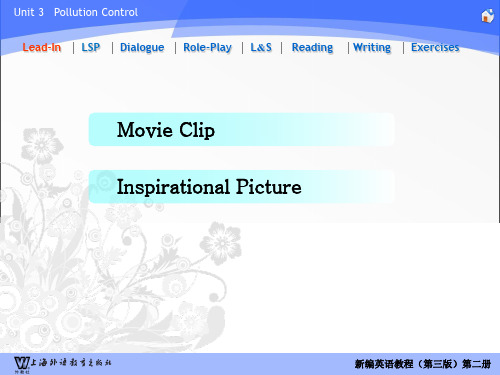
Movie Clip Inspirational Picture
新编英语教程(第三版)第二册
Unit 3 Pollution Control Lead-In LSP Dialogue Role-Play L&S Reading Writing Exercises
新编英语教程(第三版)第二册
Unit 3 Pollution Control Lead-In LSP Dialogue Role-Play L&S Reading Writing Exercises
Inspirational Picture This photo was taken in Linfen, Shanxi province. What does it bring to your mind? Can you describe the picture?
新编英语教程(第三版)第二册
Unit 3 Pollution Control Lead-In LSP Dialogue Role-Play L&S Reading Writing Exercises
all-access hoverchairs: the chairs that float in the air and can go anywhere. This is a special device in which people lie and travel everywhere in the Axiom in this movie.
except John. John should/ought to have come with us.
新编实用英语2课件 PPT

Unit Goals
Talking Face to Face
Being All Ears
Maintaining a Sharp Eye
Unit Goals
1.What Students Should Learn to Do:
a. Making an oral invitation: Inviting people to join in daily activities Inviting people to formal occasions b. Making a written invitation: Writing an invitation card or a letter for: Personal invitations Official invitations 1. c. Giving a reply to: An oral invitation A written invitation
Unit Goals
Talking Face to Face
Being All Ears
Maintaining a Sharp Eye
Trying Your Hand
2. What Students Should Know About:
a. Invitation culture: Western and Chinese
Unit Goals
Talking Face to Face
Being All Ears
Maintaining a Sharp Eye
新编实用英语第二版2电子教案unit3PE2-U3-Session1

Unit 3 Communication
by Phone Session 1
Section I Section II
Lead in
Unit 3 Communication
by Phone
Session 1
Questions for understanding the telephone message
A. Hello, can/may/could I speak to (Mrs. Ramos)? B. Hello, I’d like to speak to (Ms. Kim). C. Hello, this is (Tony Silver). May I speak to (Mr. Zhang Lihua)? D. I would like to talk to (Jack Simpson). E. Good morning/afternoon. (Jack Simpson) speaking. F. I’d like to talk to (Jack Simpson). G. Can you put me through to (23-5531)?
4. Do you know how to pass the message to the person called?
A. Would you mind telling him that … B. Please tell her that…
Section I
5. Do you know how to extend a phone call?
1. Who is calling? 2. When does he make the phone call? 3. What message does he leave? 4. Who is the person called? 5. What is he expected to do? 6. Who passes the message to the person called?
新编实用英语综合教程2(第三版)课件

Back
Unit | One
3) Inviting friends to a movie Paul: What’re you doing on Saturday night? Molly: I’m not sure. Why? Paul: Well, I was thinking of asking you to go to a movie with me this weekend. Molly: Oh, why not? 4) Declining an invitation to go roller-skating Mike: Would you like to go roller-skating with me this Saturday afternoon? Sarah: Saturday afternoon? I’m afraid I won’t be able to. Mike: What about Sunday afternoon? Sarah: That would be nice. 5) Declining an invitation to go out to dinner Steve: Well, thank goodness it’s Friday, Jean. Cindy: Yes, it was a long week, Ken. Steve: Would you like to go out to dinner tonight? I’d like to take you somewhere really special. Cindy: Oh, thanks, but ... maybe some other time. I’m very busy tonight. Window on Key Words 好极了 祝贺 滑旱冰
新编实用英语PE2-U1-Session3PPT课件

Section III Passage II
Section IV
Lead in Sentences Often Used in a Letter
Unit 1 INVITATIONS
Session 3
1. It seems ages since we heard from you. 2. I am writing straightaway in the hope that (it will be
Section III Pasபைடு நூலகம்age II
Section IV
Lead in Related Information
Unit 1 INVITATIONS
Session 3
This is an informal letter between friends. The tone of this letter is casual. The language is not so formal. This kind of informal invitation letter is often written in the third person. For example, “in the hope that it will be possible for you both to spend a few days with us during your stay in England.” “ and it would be nice if you could come then, too.” But a formal invitation card is usually written in the first person.
possible for you both to spend a few days with us during your stay in England). 3. There’s not a great deal to report from our end. 4. I’d better stop here now; I’m supposed to be spending this evening (writing Christmas cards). 5. Write or phone as soon as you can--- and come! 6. Love from us all. 7. Yours ever, (Richard).
新编英语教程2(第三版)第3单元课件
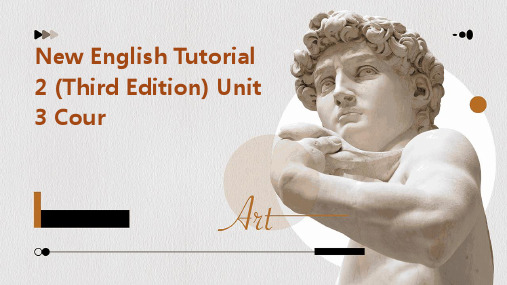
对于每道练习题,教材都提供了详细的答案解析,帮助学生理解正确答案的原因和解题思路,同时指出常见错误答案的误区。
Listening practice questions and answer analysis
05
CHAPTER
reading comprehension
本单元的阅读材料主要围绕“文化交流与全球化”展开,涉及跨文化交际、文化多样性、文化冲击等方面的内容。
Grammar exercises
04
CHAPTER
Listening training
本单元的听力材料主要包括对话、讲座、新闻报道等,旨在帮助学生提高在不同语境下的听力理解能力。
听力材料类型
听力材料的难度适中,适合大多数学生的学习水平。对于较难的部分,教材提供了详细的注释和解释。
听力材料难度
Overview of Listening Materials
03
CHAPTER
Grammar explanation
Present perfect tense
This unit focuses on the present perfect tense, which is used to talk about actions in the past that have relevance to the present.
Writing guidance
Essay writing
This type of writing requires students to present their ideas in a coherent and well-structured manner, with clear introduction, body paragraphs, and conclusion.
新编实用英语2第四版Unit-3--section1-Communication-by-Phone课件
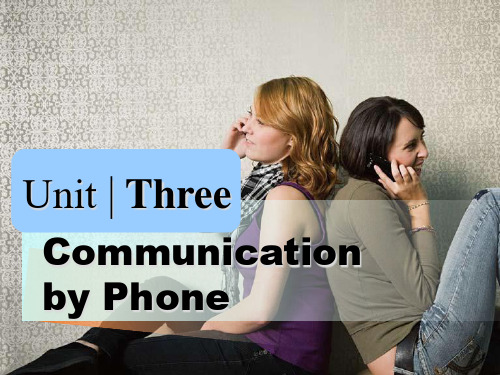
Window on Key Words 接待员
拨号
Back
Acting out the Tasks
Speak and Perform
2 Work in pairs and act out the tasks by following the above mini-talks.
1 Task: Ask for the number of the employment office in Chicago.
2) May I speak to ... ? Joe: Hello. Is this the Chemistry Department?
Secretary: Yes, it is. What can I do for you? Joe: May I speak to Mr. Mifflin?
Secretary: Hold on, please.
4) Can you tell me your hours? Receptionist: Hello, the Art Museum. Can I help you?
Jake: Yes. Can you tell me ... er, what are the opening hours, please? Receptionist: We open at ten in the morning and close at five in the afternoon.
Unit | Three
Communication by Phone
Unit Goals:
What You Should Learn to Do
1. Make a phone call 2. Answer the phone 3. Leave and take a message 4. Pass the message to the person being called 5. Extend a phone call 6. Take / fill in a message
(完整版)新编实用英语综合教程2unit1课后练习答案
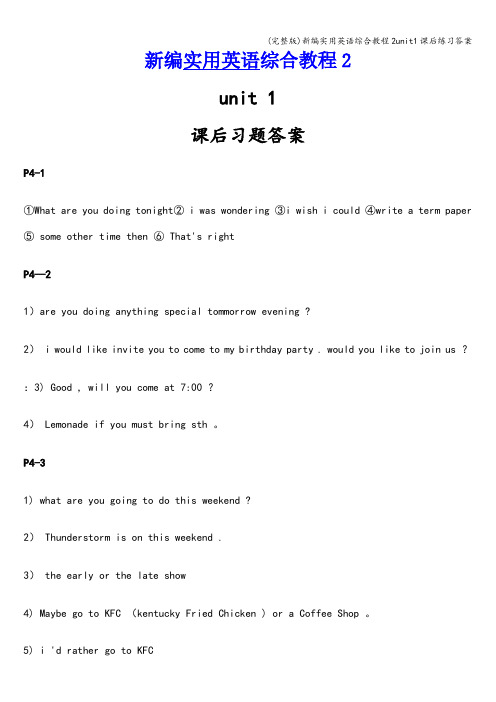
新编实用英语综合教程2unit 1课后习题答案P4-1①What are you doing tonight② i was wondering ③i wish i could ④write a term paper ⑤ some other time then ⑥ That's rightP4—21)are you doing anything special tommorrow evening ?2) i would like invite you to come to my birthday party . would you like to join us ?:3) Good , will you come at 7:00 ?4) Lemonade if you must bring sth 。
P4-31) what are you going to do this weekend ?2) Thunderstorm is on this weekend .3) the early or the late show4) Maybe go to KFC (kentucky Fried Chicken ) or a Coffee Shop 。
5) i 'd rather go to KFC6) when and where shall we meet ?P5—1①tomorrow②ball game③skiing④for a long time ⑤very warm⑥agreeP6—2① No ,she doen’t ②going to the ball game and skiing ③She heard it on the radio ④ No , he doesn't ⑤ He will give claire a callP6-3① the time and place ②fine ③formal written ④ in writing ⑤ at the bottom ⑥ attend ⑦ in person or by phone ⑧ comfortableP7-41) d 2) C 3) a 4) bP8—11) You should not fell committed until you know what the invitation2) it is : apology , reason for refusal , thanks for the invitation .3) it means each pays one's own check when eating in a restaurant 。
新编英语教程2unit3PPT课件
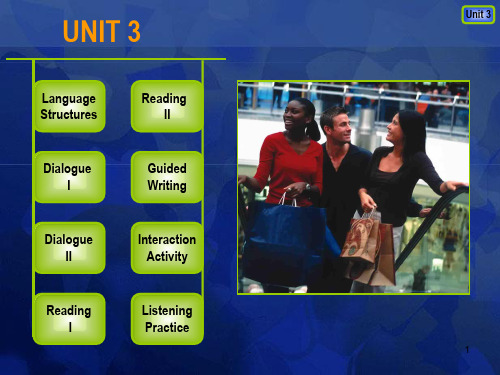
let me know.
.
16
Language Points
.
15
Language Points
Dialogue I Unit 3
1 You’re not bothered by rude people with their rough behaviour
①Bother
1.WORRY
e.g. Being in a crowd really bothers me. It was very noisy, but that
didn't bother me.
It really bothered me that he'd forgotten my birthday.
2. DISTURB OR ANGER
e.g. Sorry to bother you, but Mr. Grey is on the line.
Cliff didn't want to bother himself with masses of detail.
condition again e.g. The hotel has been renovated and redecorated.
[NOUN] renovation
.Leabharlann 11Unit 3Dialogue Farewell to Rude Manners I
Think it
➢ When someone treats you rudely, what is your response?
.
14
Unit 3
Dialogue Farewell to Rude Manners I
Retell
新编实用英语综合教程2第五版第三单元课件travel
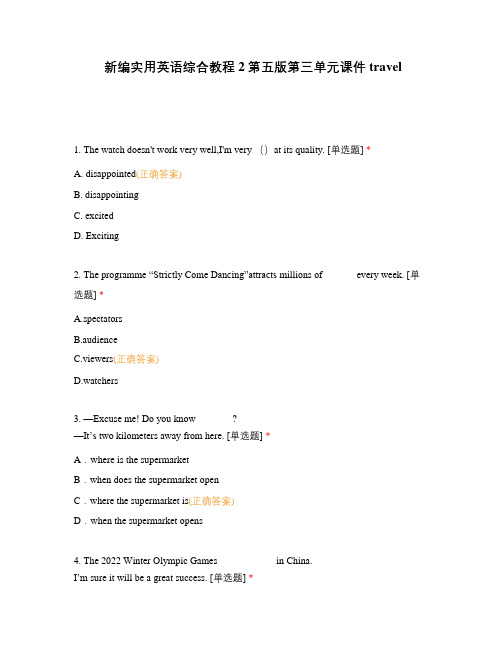
新编实用英语综合教程2第五版第三单元课件travel1. The watch doesn't work very well,I'm very ()at its quality. [单选题] *A. disappointed(正确答案)B. disappointingC. excitedD. Exciting2. The programme “Strictly Come Dancing”attracts millions of ______ every week. [单选题] *A.spectatorsB.audienceC.viewers(正确答案)D.watchers3. —Excuse me! Do you know _______?—It’s two kilometers away from here. [单选题] *A.where is the supermarketB.when does the supermarket openC.where the supermarket is(正确答案)D.when the supermarket opens4. The 2022 Winter Olympic Games __________ in China.I’m sure it will be a great success. [单选题] *A.holdB.will holdC.were heldD.will be held(正确答案)5. _______special class we had today!We learned about kung fu. [单选题] *A.HowB.WhatC.How aD.What a(正确答案)6. _________ me a chance and I’ll bring you a surprise. [单选题] *A.Give(正确答案)B.GivingC.GivesD.To give7. It’s hard for us to say goodbye _______ we have so many happy days to remember. [单选题] *A.soB.because(正确答案)C.althoughD.until8. —Must I go out to have dinner with you, Mum?—No, you ________, my dear. You’re free to make your own decision. [单选题] *B.mustn’tC.needn’t(正确答案)D.can’t9. They don’t live here any longer. They _______ to Chengdu last month. [单选题] * A.moveB.moved(正确答案)C.will moveD.are moving10. I can’t hear the teacher _______ with so much noise outside. [单选题] * A.clearly(正确答案)B.slowlyC.warmlyD.bravely11. It was raining. My father asked me _______a raincoat. [单选题] *A.takeB.takesC.tookD.to take(正确答案)12. _______visitors came to take photos of Hongyadong during the vacation. [单选题] *B.Thousand ofC.ThousandsD.Thousands of(正确答案)13. The show was so ______that I couldn’t stop laughing. [单选题] *A.sadB.terribleC.funny(正确答案)D.serious14. —I have a bad cold.—Sorry to hear that.You’d better go to see a ____at once. [单选题] *A.doctor(正确答案)B.cookC.writerD.farmer15. I’m surprised at the new look of ________ hometown. [单选题] *A.IB.meC.my(正确答案)D.mine16. I always play basketball to relax myself ________Saturdays. [单选题] *A.on(正确答案)B.inC.atD.by17. 单词“Coronavirus”的正确解释为 [单选题] *A.王冠B.冠状病毒(正确答案)C.顶峰D.棘突18. 正确描述“传染病”的单词为? [单选题] * epidemic(正确答案)diseasepneumoniasickness19. 正确描述“症状”的单词为? [单选题] * sensationsymptom(正确答案)complicationscharacter20. 正确描述“温度”的单词为? [单选题] * VaccinateUltrasoundTemperature(正确答案)Dampness21. 正确描述“咳嗽”的单词为? [单选题] *Cough(正确答案)ThroatDiarrheaSneeze22. 正确描述“发烧”的单词为? [单选题] *asthmafever(正确答案)enteritishot23. A peculiarly pointed chin is his most memorable facial _____. [单选题] *A) markB) feature(正确答案)C) traceD) appearance24. John Dewey believed that education should be a preparation for life, that a person learns by doing, and that teaching must _____the curiosity and creativity of children. [单选题] *A) seekB) stimulate(正确答案)C) shapeD) secure25. Criticism and self-criticism is necessary _______ it helps us to find and correct our mistakes. [单选题] *A) by thatB) at thatC) on thatD) in that(正确答案)26. However, at times this balance in nature is _______, resulting in a number of possibly unforeseen effects. [单选题] *A) troubledB) disturbed(正确答案)C) confusedD) puzzled27. The patient’s health failed to such an extent that he was put into ___care. [单选题] *A) tenseB) rigidC) intensive(正确答案)D) tight28. Does everyone on earth have an equal right _ an equal share of its resources? [单选题] *A) byB) atC) to(正确答案)D) over29. In 1914, an apparently insignificant event in a remote part of Eastern Europe________ Europe into a great war. [单选题] *A) insertedB) imposedC) pitchedD) plunged(正确答案)30. We had to ________ a lot of noise when the children were at home. [单选题] *A) go in forB) hold on toC) put up with(正确答案)D) keep pace with31. What he said just now had little to do with the question ________ discussion. [单选题] *A) on(正确答案)B) inC) underD) at32. Over a third of the population was estimated to have no ________ to the health service. [单选题] *A) assessmentB) assignmentC) exceptionD) access(正确答案)33. _____, where are you from?() [单选题] *A. By the way(正确答案)B. In this wayC. On the wayD. In the way34. Tom's mother will let him _____ traveling if he comes back in five days.() [单选题] *A. to goB. goesC. wentD. go(正确答案)35. There are two beautiful _____ in the picture.() [单选题] *A. womansB. women(正确答案)C. womanD. womens36. My brother and I like football. ____ play it together once a week.() [单选题] *A. IB. TheyC. We(正确答案)D. You37. --- What do you usually do in your spare time? --- _______() [单选题] *A. I often listen to music(正确答案)B. I am a teacherC. I m a member of the art clubD. You are very kind38. He usually _____ at 6:30 am.() [单选题] *A. gets toB. gets up(正确答案)C. gets overD. gets in .39. Tom didn't _______ his exam again. It was a pity. () [单选题] *A. failB. winC. pass(正确答案)D. beat40. Yesterday I ___ a magazine. It was very interesting.() [单选题] *A. sawB. lookedC. read(正确答案)D. watched41. Please come in, Alice. Welcome to______ house.() [单选题] *A. her.B. hisC. my(正确答案)D. your42. --- May I introduce myself? My name is Bill Jones.---__________.() [单选题] *A. I am glad to meet you, Mr. Jones.(正确答案)B. I am pleased, Mr. BillC. I' m very pleased, BillD. It's my honor, Jones.43. --- What songs can you sing? --- ________() [单选题] *A. Welcome to ChinaB. No, I can" tC. I can sing English songs(正确答案)D. I can repair computers.44. --- Have a nice weekend ! ---_________.() [单选题] *A. That’s all rightB. Thank you. You too(正确答案)C. See you next weekD. I’m glad to hear that45. There is no enough ________ on the corner to put the table. [单选题] *A. placeB. room(正确答案)C. floorD. ground答案解析:此题考查名词辨析。
新编实用英语综合教程2(第三版)Unit3
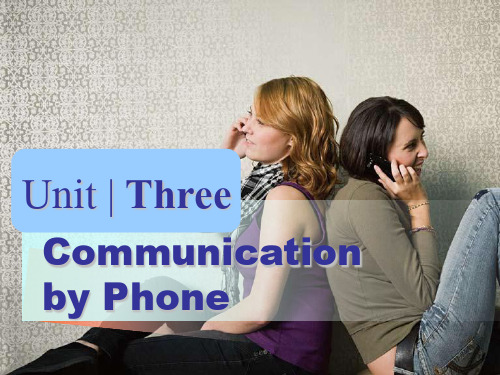
5) Where did Dr. An drive Tom to, the hotel or the school? The hotel.
Back
Unit | Three
Listen and Complete
6 Listen to the dialogue for the last time and fill in the blanks according to what you have heard.
ten-minute, fifteen-minute walk to the school.
Back
Unit | Three
Listen and Answer 5 Listen to the dialogue again and then answer the following questions orally.
Unit | Three
Communication by Phone
Unit | Three
Handling a Dialogue
Listen and Decode
Script
4 Listen to a dialogue and decode the message by finding out the correct choices in the brackets according to what you have heard.
need to mention the mobile phones people play with evห้องสมุดไป่ตู้rywhere. The fixed phones
are easily accessible. Almost every 2 __fa_m__il_y_ has a phone. Some families even
《新编实用英语》(综合教程)Unit1
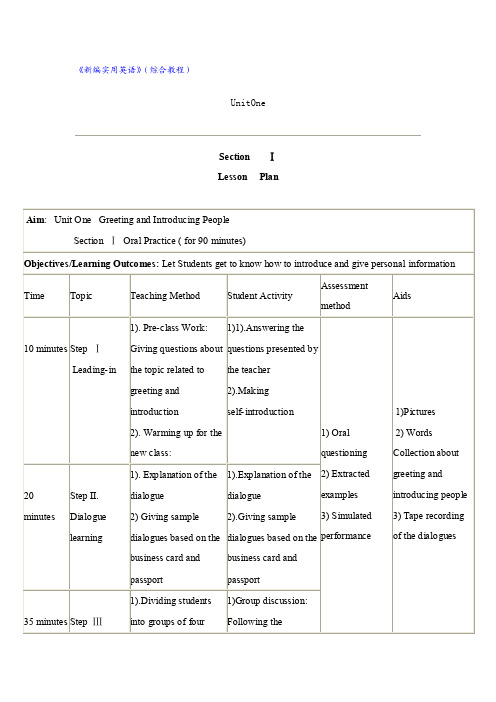
《新编实用英语》(综合教程)UnitOneSection ⅠLesson PlanContent: Section ⅠTalking face to faceAim: The topic area of Taking Face to Face in this unit is to talk about greeting people and introducing with each other. The focus of functions is to Let Students get to know how to introduce and give personal informationImportant and difficult points:Procedure and methods:Step I. Leading-in1. Pre-class Work: Giving questions about the topic related to greeting and introduction2. Warming up for the new class3. Student Activity:1).Answering the questions presented by the teacher2). Making self-introductionStep II. Dialogue learning1. Explanation of the dialogue2. Giving sample dialogues based on the business card and passport3. Student Activity:1). Listening to the tape recording of the dialogues2).Pair work: Learning the dialogues by heart and Reading out the dialogues loudly in pairs.Step ⅢActing outAfter learning the five dialogues on the book1 Dividing the students into groups of four or five2 Offering more situations for students to make dialogue3 Summarizing this part4 Student Activities:1).Group discussion: Following the dialogue and making dialogues based on the given situations2). Comments on classmates’performanceStepⅣPutting in use1. Completing and checkingInstructions: Ask students to work in groups to complete by filling in the blanks on Page 4, and then check the answers in class.2. RespondingInstructions: Ask students to practice Exercise 2 on Page 4 of the textbook orally . Offer the situation in Chinese, and ask students to give the English version, the whole class works together. After each activity, check the answers and make comments promptly.Section ⅡLesson planSection ⅡListening Practice (for 90 minutes)Objectives/Learning Outcomes: Correct understanding of the listening material about greeting and introducing peopleTime Topic Teaching Method Student Activity AssessmentmethodAids20 minutesStep ⅠListeningand decodeListen andrespond1) Introduction of listeningcomprehension2) Explanation of the dialogueand comments1) Choosing the rightwords they hear2) Answering thequestions based onthe dialogue theyhear1) Questioning thestudents withsome words andphrases relatedwith the listeningmaterial2) Distinguishingsound -similarwords3) SimulatedperformanceTaperecording ofthedialogues15 minutes Step II.Listen andcompleteListen andjudge1) Introduction of somelistening skills: How to catchthe information you need2) Checking the answers1) Listening to thedialogue2) choosing the rightanswer for themultiple choiceexercises40 minutes Step ⅢListen andreadListen andmatch1).Explanation of the keywords2).Explanation of the listeningmaterial3).Checking the answers1) Filling in theblanks with thewords they hear2) Matching theinformation incolumn A withchoices in column B3) Writing out thegeneral idea of thepassage byContent: Section ⅡBeing All EarsAim: Make the students master more useful vocabulary phrases and sentences to express themselves in English .when they meet people and introduce with each other. Important and difficult points:1. Introduction:Listening comprehension is the receptive skill in the oral mode. When we speak of listening what we really mean is listening and understanding what we hear.In our first language, we have all the skills and background knowledge we need to understand what we hear, so we probably aren't even aware of how complex a process it is. Here we will briefly describe some of what is involved in learningto understand what we hear in a second language.2.Listening Situations:There are two kinds of listening situations in which we find ourselves:·Interactive·non-interactive.Interactive listening situations include face-to-face conversations and telephone calls, in which we are alternately listening and speaking, and in which we have a chance to ask for clarification, repetition, or slower speech from our conversation partner. Some non-interactive listening situations are listening to the radio, TV, films, lectures, orsermons. In such situations we usually don't have the opportunity to ask for clarification, slower speech or repetition.Listen for main ideas. The main ideas are the most important points the speaker wants to get across. They may be mentioned at the start or end of a talk, and repeated a number of times. Pay special attention to statements that begin with phrases such as "My point is..." or "The thing to remember is..."Give your full attention on the person who is speaking. Don't look out the window or at what else is going on in the room.Remember: time is on your side! Thoughts move about four times as fast as speech. With practice, while you are Listening you will also be able to think about what you are hearing, really understand it.Procedure and methods:Step ⅠListen and decode & Listen and respond1. Introduction of some listening skillsInstructions: Help students get to know how to distinguish sound-similar words.2. Explanation of the dialogue and commentsInstructions: In this part students must choose out the words they hear from the tape recording. After playing the tape twice, check their answers.3. RespondingInstructions: After listening to the tape for the third time, students are asked to answer the questions listed out in the textbook orally.Step II. Listen and complete & Listen and judge1. Completing after listeningInstructions: Ask students to fill in the blanks with the words they get from the tape recording after hearing it for twice.2. Judging after listeningInstructions: After students listen to the same dialogue for the third time, ask them to choose the correct answers to the given sentence.Step Ⅲ.Listen and read, Listen and match1. Explanation of the key wordsInstructions: Students are going to hear a passage with some blanks for them to fill in. Before playing the tape recording, explain some key words which will appear in it. Ask students to memorize these words.2. Explanation of the listening materialInstructions: After students finish the filling-in, explain some difficult language points in the passage.3. Matching after listeningInstructions: In this part a dialogue will be given to each of the students, after they listen to it, they are asked to match the information in Column A with the choices in Column B. Then check their answers.4. Answering questions after listening to the passage again.Instructions: In this part the students are asked to write out the general idea of the passage in one paragraph by answering some listed questions in the textbook.Step Ⅳ. Listen and conclude1. Exercises in the workbookInstructions: Give explanations to some new words in the workbook, and ask students to finish the exercises in it, then check their answers.Asking students to memorize the new words which appear in the textbookSection ⅢLesson PlanTime Topic TeachingMethodStudent ActivityAssessmentmethodAids5minutes Step ⅠLeading-in1) Revision2) Thebackgroundinformationabout thepassage3) Warming upfor the newpassages1) Reciting somesentences theyhave learned inthe previous class2).Makingself-introduction1) Oralquestioning2) Extractedexamples3)Simulatedperformance1) Mapsof theweatherforecast2)WordsCollectionaboutweather3)Taperecordingof thedialogues35 minutes Step IIComprehensionof the passage1) Textpresentation andlanguage points2) Asking somequestions aboutthe passage3) Summarizingthe passage1) Listening tothe tape recordingof the passage2) Answering thequestions3) Retelling thepassage in a fewword20 minutes Step ⅢFurther exercise1) Conductingstudents to finishthe exercises onpage 102) Explanation ofthe difficult partsof the exercise3) Checking the1) .Finishing theexercise on page102).Learning theusage of somekey wordsContent: Section ⅢReading Comprehension“Maintaining a Sharp Eye”. The students will first read the two useful passages of "The way Americans Greet" and "A little About Me". The teacher will interpret the new words and structures in detail. Finally help the students do the exercises.Aim: Master the key words and structures, and learn something about the way American great This will give them an idea of how to greet foreigners especially American and how to introduce themselves.Important and difficult pointsProcedure and methods:Step I. Leading in1. Revision of the previous lesson2. Warming up for the new passages3. Student Activity:1).Reciting some sentences they have learned in the previous class2).Making self-introductionStep II Comprehension of the passage1.Explanation of the new words and language points in the passageA. Important Words and PhrasesInstructions: Give some examples to explain the difficult words. Ask students to make sentences with the words they just learn.1). greet: v. say words of welcome to, express one‘s feelings on receiving sb. 问候,致意,打招呼e.g.: It is important for the students to learn how to greet people in English.The American professor greets his students with “Morning!”2).relationship:n. particular connection or relation; instance of being related 关系,联系e.g.: He is making efforts to develop a lasting relationship with Lizzy.3).wave: v. move one‘s hand to and fro, up and down (to give a greeting or say goodbye) 挥手致意,舞动e.g.: Jean waved goodbye to her Chinese friends,4). leave: v. go away from; fail or neglect to take/bring sth. 离开,出发;留下,遗忘e.g.: The beautiful city has left a deep impression upon our mind.5).impression: n. effect produced on the mind or feelings 印象e.g.: His speech made a strong impression upon the audience. 他的演说给听众留下了深刻的印象。
